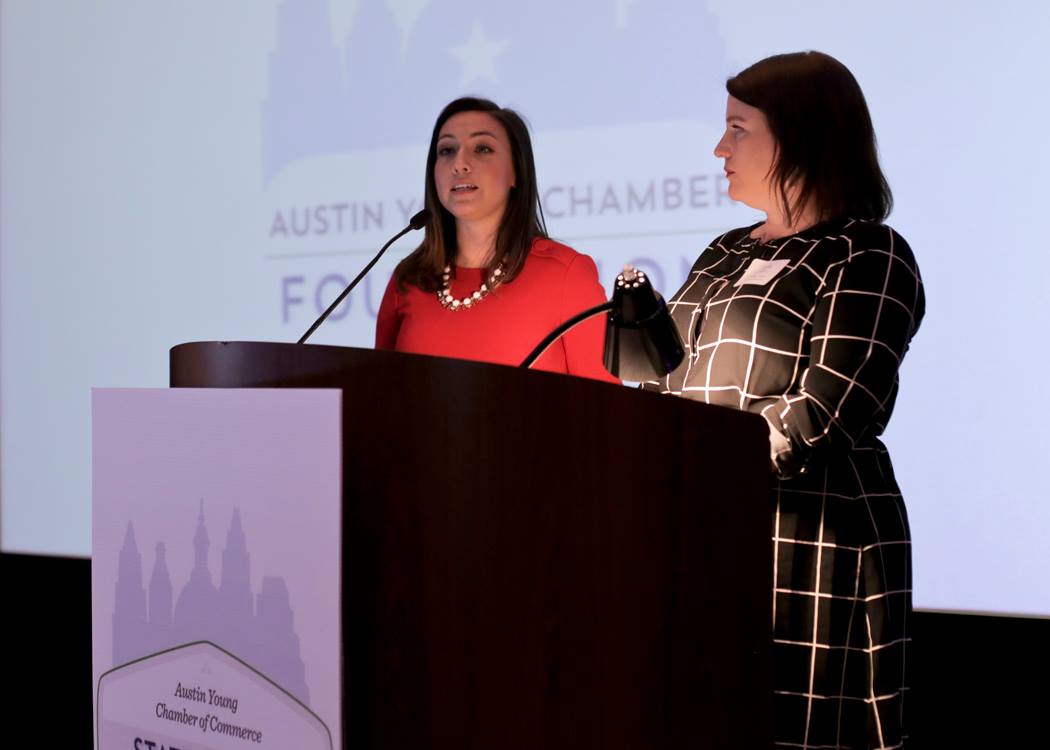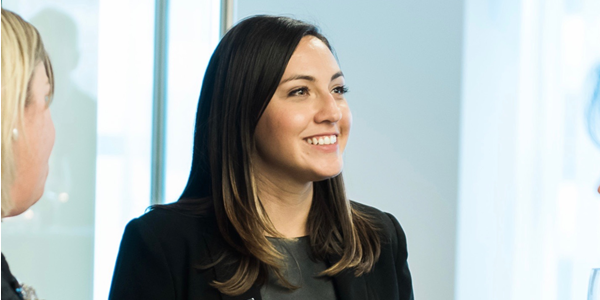
By Elizabeth McGuire
Yvette Ruiz may live 300 miles away from the small South Texas town where she grew up, but her home is never far from her heart. In fact, it is this anchor to her childhood community that gives Ruiz perspective in her growing career, which now focuses on supporting underserved communities like her hometown of San Juan.
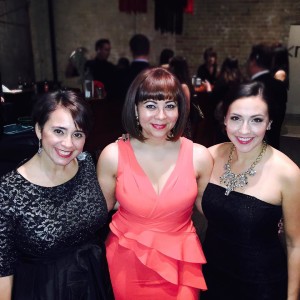 After a childhood filled with service, Ruiz graduated from the University of Texas with a B.S. in Public Relations, a minor in Business and a yearning to do “meaningful, fruitful work.” Directly out of college she began working for National Instruments in their public relations and community outreach departments. In 2014 Ruiz moved to JPMorgan Chase, and today she serves as a Vice President for the Office of Nonprofit Engagement.
After a childhood filled with service, Ruiz graduated from the University of Texas with a B.S. in Public Relations, a minor in Business and a yearning to do “meaningful, fruitful work.” Directly out of college she began working for National Instruments in their public relations and community outreach departments. In 2014 Ruiz moved to JPMorgan Chase, and today she serves as a Vice President for the Office of Nonprofit Engagement.
She has been recognized by the Austin Business Journal’s Profiles in Power and named one of GivingCity’s 30 Young Philanthropists. In 2015 Ruiz was appointed by Mayor Steve Adler’s office to serve on the City of Austin Commission for Women.
Ruiz currently serves on the KLRU Advisory Board, is a partner with Mission Capital’s Social Venture Partners, is chair-elect of Austin Young Chamber Foundation and volunteers with the Junior League of Austin.
She is a 2011 graduate of Leadership Austin’s Emerge program and is this year’s recipient of the Leadership Austin Ascendant Award.
How did growing up in the Rio Grande Valley influence your life and career?
The Valley is very community oriented, and San Juan, my hometown of 34,000 people, is no different. The poverty rate in South Texas is high. The state average is 15% but in the Valley, it’s 34%. Growing up, I never recognized my community as “underserved” or “at-risk” because we were rich in culture and community. It wasn’t until shortly after high school that I realized the vast connotations that the rest of the state has towards South Texas.
My dad went into public service as City Manager for San Juan when he was only 21 years old. Later he was elected County Clerk then County Judge, the youngest county elected official for Hidalgo County. My mom was an educator in the city where she was raised. She was the first female high school principal the district ever hired. Our dinnertime conversations growing up were always grounded in education, community, and family support for our neighbors. I have two older siblings, and all of us have built in community advocacy and support into our personal and professional lives. My parents couldn’t help but pass on their passion to their kids.
When I was a senior in high school I participated in the Americorps Youth program and volunteered about 1,200 volunteer hours with the Boys and Girls Club and tutoring English and math to elementary school kids. (I can’t tell if I helped or hurt their grades in the math department!) As a result, I received a service award from President Bush. Again, this is how we were raised. It’s just what we did.
Tell us about the work you do for JPMorgan Chase… 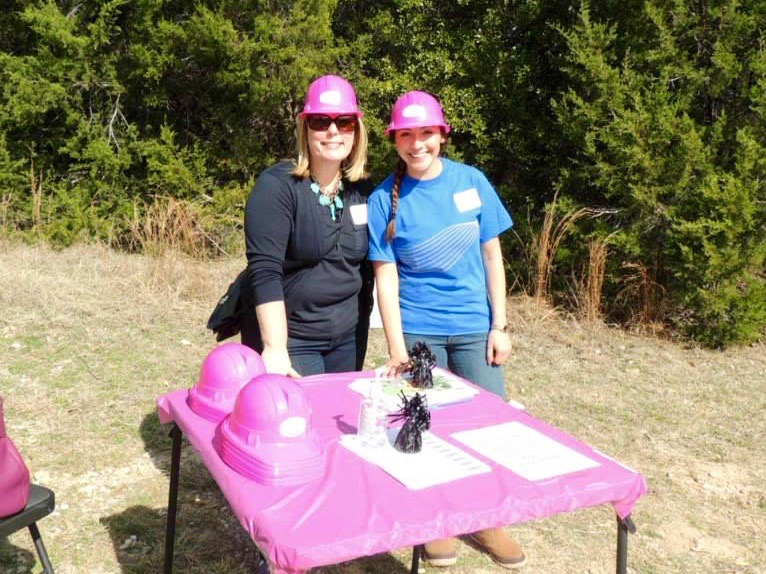
Regionally, I focus on working with nonprofit organizations that support low-income communities and communities of color in the areas of financial inclusion, workforce development, and small business growth. In Texas and surrounding states, I look for nonprofit or city-led initiatives that bring together the public, private, and nonprofit sectors in meaningful ways to address their community’s most pressing social challenges.
My role expanded recently; and I’m now leading the Firm’s work on supporting nonprofits build their organizational capacity and effectiveness. Healthy communities need a strong nonprofit ecosystem, and this doesn’t happen without investment and nurturing. Local nonprofits help to prepare people, especially vulnerable populations, for economic opportunity. These local organizations consistently tell us they want to get stronger and deliver greater impact but they don’t have the resources.
Many local nonprofits are caught in a “Catch-22”. They have to be great at what they do to secure funding; however, in the meantime, they are being asked to do more with less. How do you strengthen your organization when it is not properly funded, and you are trying to keep up with the demand for your services? For this reason, we decided to focus on building the capacity of community-based organizations as a way to increase economic opportunity.
What is the most rewarding part of your job?
This is the hardest I’ve ever worked. My work is extremely demanding yet very rewarding. There is something to learn every day from new experiences and different people.
Sometimes the work we do connects back to me personally. When I was a little girl, my parents would fly my grandmother and me to Denver to visit my great uncle who was a World War II veteran. Instead of going to summer camp, I would spend time with him. I have wonderful memories of us sitting in his backyard and listening to his great war stories. At that time, I had no idea that his home was low-income housing. Years later, the Denver United Way pitched a project to me, and it turned out to be within the same neighborhood in which my great uncle had lived. Isn’t it a small world?
In my job, I have encountered many situations similar to this one. It’s overwhelming and humbling, but it fills me with hope. And I feel really fortunate that this is what my life looks like today.
Tell us about serving on the City of Austin Commission for Women…
It was great. The women sitting around this table are so well connected and so passionate and some of the most under-the-radar people you have ever met. It was amazing–being able to sit and learn how they think. It was uncomfortable (in a good way) for me because non-profits are always my go-to for community/social change. The approach this group of women took. It was very insightful.
 What drew you to apply to Leadership Austin?
What drew you to apply to Leadership Austin?
I learned about Leadership Austin through my Community Relations job at National Instruments. NI hosted speakers and I kept volunteering at the events. After the events were over, I’d walk up to the speaker and say, “I’m not a Leadership Austin participant, but I have so many questions. Will you take five minutes to talk with me?” (BTW – This is how I’ve met half the people I know in Austin.)
I was a renegade participant very early in my career. When I applied to Emerge, it was the perfect time in my life. I was in my mid 20s with a couple years of work experience and interested in learning about a community that wasn’t my own. I wanted to get involved, and Leadership Austin seemed to have the market cornered on meaningful community engagement.
Leadership Austin played a huge role in shaping me into who I wanted to be as a community leader, and it connected me with a network of like-minded professionals. It wasn’t cliché or trivial, and provided me with a way to find my tribe. Many people from my Emerge class are still very dear friends of mine today. (Emerge Class of ’10: BEST. CLASS. EVER!)
What lessons or experiences from Emerge have stuck with you?
In one of the sessions, we were given an exercise where they asked us, “If someone gave you $10,000, what would you do with it?” It seemed like an astronomical sum of money to me. Like I could solve world hunger with it!
Then the next question was, “What do you want the next 5 years to look like?” The combination of those two back-to-back questions was something I hadn’t considered before. I was still focused so narrowly on the short-term that I hadn’t developed a vision of what I wanted life to look like beyond the next 6-months. I’ve always had conflicting feelings on being successful in career and being a community servant – like somehow those two things don’t jive. But they do! I learned I could still do well and not to the detriment of my community.
During the Emerge class, I realized I could be a successful Latina business woman, be empowered by the community in which I was raised, and make myself a part of the community fabric of my new hometown, Austin.
Advice for emerging leaders?
Don’t be afraid of people. So many people are afraid of rejection or afraid of asking for help. For example, I felt disconnected from the Austin Hispanic community so I reached out to Geronimo Rodriguez at Seton. It turns out we grew up in the same hometown and had a very similar upbringing. When I told him I felt disconnected from the community that I really wanted to be a part of, he had no problem writing a list – right then and there – of people I needed to meet. Even more, he offered to make the introductions. After our meeting, he sent me back to my office with a long list of books he thought I should read!
That’s saying something. That’s community. And none of that would have happened if I hadn’t asked.
I’ve found that when you ask people for help, more often than not, they will give you more support than initially anticipated. You just can’t be scared to ask.
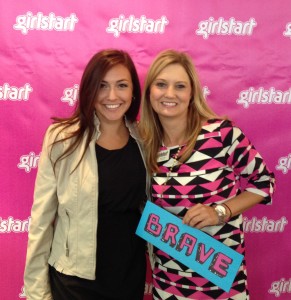 What is Austin’s greatest community need?
What is Austin’s greatest community need?
The exodus of poverty. Diverse communities are vibrant communities and healthy communities, and right now we are devolving our diverse community. I’m really concerned. The fact that we have a declining poverty rate in the city of Austin is incredibly alarming. The rate is declining because our underserved residents are leaving. It’s incredibly disruptive, and a further decentralization of social and public services.
When our low-income residents and impoverished communities move away from their social service providers, it’s obviously harder for residents to get the support they need and harder for nonprofits to expand their geographic reach. Beyond that, we as a people don’t see the poverty/need as much, and I think we lose compassion and walk around with the notion that poverty doesn’t exist in Austin.
We have extreme child hunger happening in this city and surrounding cities. How can we live in Austin, Texas, where everyone eats and plays so well and is so focused on health and nutrition, and we still have a significant amount of children going to bed hungry every day. How is that still our reality?
What make a good leader?
My philosophy is, “Trust your people to do what they say they are going to do.” Some people say, “You earn trust.” That’s one way. For me, it’s “Here’s my trust. You have it at the onset. I believe in you. Let’s go!”
I also think being jovial and light-hearted, in spite of tough situations keeps people more motivated and engaged than otherwise. If someone feels that they’re getting hit with a guilt stick every time they walk into a meeting/volunteer opportunity, no one is going to come back. If we keep things in perspective and try to bring a light-hearted playfulness…I think there’s real value in that.
Thoughts on receiving this year’s Ascendant Award?
I could not feel more honored and more special. Especially having only lived in Austin for 12 years, 3 of those in college. I feel lucky that I landed and stayed in Austin and was received by a community that was so willing to take me in.

